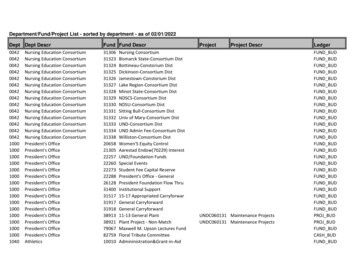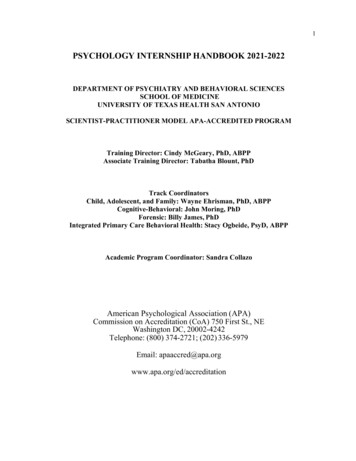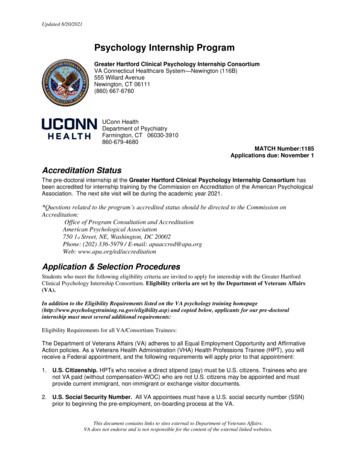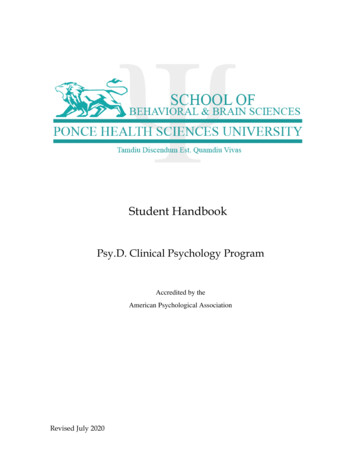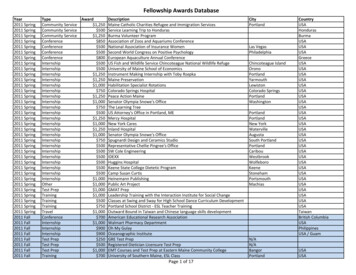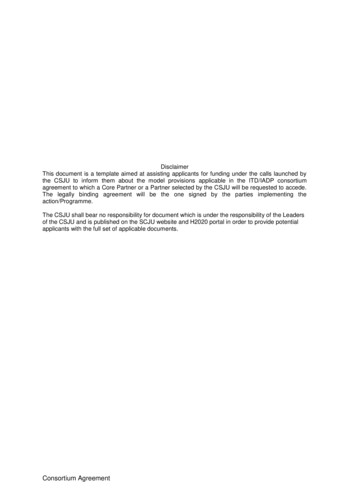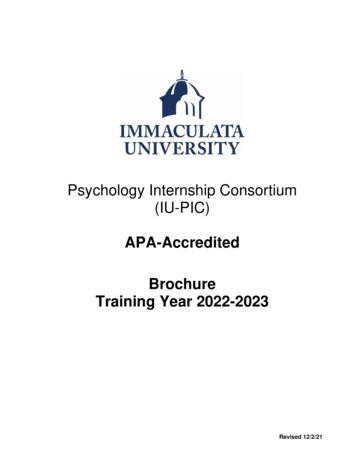
Transcription
Psychology Internship Consortium(IU-PIC)APA-AccreditedBrochureTraining Year 2022-2023Revised 12/2/21
2Executive Training DirectorMary Tabit, Psy.D.mtabit@immaculata.edu610-647-4400, ext. 3464Associate Training DirectorsChristina Wohleber, 3 – FaxHelen Polak, Psy.D.polak@rowan.edu856-256-4333Assistant Training DirectorKristen Ullrich, Psy.Dkullrich@immaculata.edu610-647-4400, ext. 3293Director of Internship Administration &APA Compliance ReportingJeannine Zackjzack@immaculata.edu610-647-4400, ext. 3492610-647-2324 – FaxImmaculata UniversityNazareth Hall 101145 King RoadImmaculata, PA /psychology-internship-consortium/Questions related to the program’s accreditation status should be directed to theCommission on Accreditation:Office of Program Consultation and AccreditationAmerican Psychological Association750 1st Street, NEWashington, DC 20002Phone: (202)-336-5979/E-mail: apaaccred@apa.orgWeb: www.apa.org/ed/accreditationThe Immaculata University Psychology Internship Consortium (IU-PIC) is also a member ofthe Association of Psychological Postdoctoral and Internship Centers (APPIC).APPIC Central Office17225 El Camino Real, Suite #170Houston, TX 77058-2748http://www.appic.org
3IntroductionThe Immaculata University Psychology Internship Consortium (IU-PIC) is an APA-Accreditedinternship. The IU-PIC provides a 2080-hour professional doctoral internship to Psy.D. and Ph.D.students and is organized and monitored by the Immaculata University Department of Psychologyand Counseling. It is a cooperative training program, which includes many agencies andorganizations across the area, primarily within commuting distance to Immaculata. The IU-PICprovides broad exposure to differing clinical populations and treatment modalities. It was establishedto provide organized, sequential learning experiences for Psychology Interns, ensuring an integratedtraining experience through shared standards, common procedures, and joint didactic learningprograms, which is consistent with the Standards of Accreditation (SoA) of the AmericanPsychological Association (APA).PhilosophyIU-PIC is based upon a practitioner-scholar model of clinical practice. The internship prepares Internsto function ethically, competently and independently as professional psychologists as they refineclinical skills and develop a sense of professional identity. Experiential and didactic training providesan enriching learning environment. Interns become analytical and critical consumers of currenttheory, practice and research, and develop a greater understanding of how cultural factors influencehuman behavior. The program prepares generalists who are capable of providing psychologicalservices to diverse populations. Interns receive training in core areas of practice including research,ethical and legal standards, diversity, professional values, attitudes and behaviors, communicationand interpersonal skills, assessment, intervention, supervision and consultation andinterprofessional/interdisciplinary skills.IU-PIC MissionIn the spirit of service-learning, our mission is to provide a broad and integrated educationalinternship training that serves the community and enhances the clinical skills, scholarly inquiry, andprofessional growth of each Intern. This learning community of Supervisors, Faculty, and Internsfosters scholarly, reflective, respectful and socially responsible attitudes and behaviors that areconsistent with the Immaculata University mission.Immaculata University MissionImmaculata University, a Catholic academic community, founded and sponsored by the Sisters,Servants of the Immaculate Heart of Mary, is committed to scholarship, formation of the wholeperson for leadership and service, and empowerment of all to seek truth, promote justice, andengage in dialogue between faith and culture.Administrative StructureThe Executive Training Director is responsible for the quality and integrity of the internship trainingprogram by maintaining the highest standards of excellence and compliance with APA SoAs andAPA Implementing Regulations, APPIC membership policies, and the APA Ethical Principles ofPsychologists and Code of Conduct. In this role, the Executive Training Director works in closecollaboration with the Director of Internship Administration and APA Compliance Reporting on thedaily management and function of the training program. The Executive Training Director providespresentations and identifies and invites professional speakers to present on topics related to clinicaltraining competencies at the monthly didactic intern seminar. Additionally, the Executive TrainingDirector reviews intern evaluations and oversees program self-assessment including quality oftraining. The Executive Training Director chairs Training Committee Meetings, which take placeevery other month, and maintains communication with Interns, Site Training Directors (and other Siteleadership and staff, as needed), Supervisors and the DCT of the Intern’s academic program.
4The Assistant Training Director reports directly to the Executive Training Director. The AssistantTraining Director works closely with the Executive Training Director, Site Training Directors,Supervisors, Director of Internship Administration & APA Compliance Reporting, Associate TrainingDirectors, and the Training Committee to maintain compliance with APPIC membership criteria andpolicies, APA SoAs, and the APA Ethical Principles of Psychologists and Code of Conduct. TheAssistant Training Director collaborates with the Executive Training Director and the Director ofInternship Administration and APA Compliance Reporting on the daily management and function ofthe program and assists in ensuring that the program is effective in meeting its defined aims andcompetencies. The Assistant Training Director provides presentations and identifies and invitesprofessional speakers to present on topics related to clinical training competencies at the monthlydidactic intern seminar. Additionally, the Assistant Training Director reviews quarterly internevaluation paperwork.The Associate Training Directors report directly to the Executive Training Director. They work withthe Executive Training Director, Assistant Training Director, Site Training Directors, Supervisors,Director of Internship Administration & APA Compliance Reporting and the Training Committee tomaintain compliance with APPIC membership criteria and policies, APA SoAs, and ensure that theprogram is effective in meeting its defined aims and competencies. In addition, each AssociateTraining Director has specific responsibilities. One Associate Training Director is responsible for theAPPIC Application Intern Selection and Match Process and the other is responsible for the InternEvaluation and Conflict Resolution: Due Process and Grievance Procedures.Site Training Directors have overall responsibility for all training-related activities at their respectivesites. Site Training Directors communicate with the Site Supervisors, the Associate TrainingDirectors, Executive Training Director, Assistant Training Director, and Director of InternshipAdministration & APA Compliance Reporting through phone, video conferencing, e-mail, in-personcommunications, and during Training Committee meetings.The Training Committee is a cooperative group consisting of the Executive Training Director,Associate Training Directors, Assistant Training Director, Site Training Directors, Director ofInternship Administration & APA Compliance Reporting and an Intern representative. The overallpurpose of the Training Committee is to provide the opportunity for feedback, discussion andcollaboration in making decisions for ongoing program self-improvement and change. The committeeparticipates in conferences and meetings every other month: four (4) quarterly face to face—remotesynchronous or in-person meetings—and two (2) phone conferences. The Executive TrainingDirector serves as the chair of these meetings. Members discuss policies pertaining to training,address training issues, review quality improvement efforts, review Handbook changes and selfassessment results, and review and discuss Intern progress.Site Supervisors at Affiliated Training Sites have full legal responsibility for the activities of theirInterns. Site supervisors communicate with the Training Committee directly or through the SiteTraining Director, Associate Training Directors, Assistant Training Director, Director of InternshipAdministration & APA Compliance Reporting or Executive Training Director and during siteadministrative meetings. They are also invited to attend the Training Committee meetings. E-mailsand information are sent to all supervisors (directly or through Site Training Directors) so they areapprised of guidelines, changes, and training expectations, and have an opportunity to makesuggestions and give feedback to the Training Committee members. Site supervisors will ensurethat all psychological services are provided in a manner that is consistent with best practices, siteorganizational policies, and relevant jurisdictional laws and regulations.The Director of Internship Administration & APA Compliance Reporting works in partnershipand collaboration with the Executive Training Director and Training Committee on decision-makingprocesses for all current and future needs of the IU-PIC. Acts as liaison for Interns, supervisors and
5training directors from outside universities and mental health agencies, students and alumni andmaintains relationships for continued collaboration and communication. Is responsible for theinitiation, coordination and management of all administrative documents pertaining to site affiliationand intern placements to support APA accreditation. Develops procedures and work products basedon internship needs for managing, collecting, and analyzing data and special projects for compliance.Maintains all pertinent records and files concerning sites, supervisors and interns to support trainingneeds and ensure adherence with APA/APPIC standards and accreditation guidelines.The Immaculata University Administrative Committee consists of the Vice President of AcademicAffairs, Dean-College of Graduate Studies, Dean-Academic Affairs, Clinical PsyD Program Director,IU-PIC Executive Training Director, Executive Director of Learning Support Services, two IU-PICAssociate Training Directors, IU-PIC Assistant Training Director, and IU-PIC Director of InternshipAdministration & APA Compliance Reporting. This committee reviews site requests for participationin the IU-PIC, provides guidance on contract and legal issues, reviews requests for emergencyfunding, and is consulted with on an as-needed basis on any program changes or site-specificconcerns.Aims & CompetenciesAs students in training, Interns are provided with didactic training and a supervised clinical trainingexperience, designed to develop practice skills and provide opportunities for those skills andcompetencies to be assessed and monitored by designated supervisors. Program competenciesinclude research, ethical and legal standards, individual and cultural diversity, professional values,attitudes and behaviors, communication and interpersonal skills, assessment, intervention,supervision, and consultation and interprofessional/interdisciplinary skills.ResearchAim #1: Intern will demonstrate independence in critically evaluating and disseminating researchor other scholarly activities at the local, regional or national level.Competencies Expected:1.1 Seeks research information to enhance clinical practice by utilizing professional literature,databases, seminars, and other resources1.2 Demonstrates an understanding of applied research and program evaluation1.3 Independently applies relevant scholarly theoretical and research findings intoprofessional activities1.4 Utilize scientific knowledge to develop a research project/presentation1.5 Disseminates findings from the research project/presentationEthical and Legal StandardsAim #2: Intern will demonstrate compliance in consistently adhering to APA professional andethical standards, and relevant laws, regulations, rules and policies governing health servicepsychology.Competencies Expected:2.1 Remains knowledgeable and acts in accordance with APA ethical principles and codeof conduct2.2 Remains aware and acts in accordance with laws, regulations, rules and policiesregarding health service psychology at the agency, local, state, regional, and federallevels
62.32.42.52.6Keeps current and acts in accordance with relevant professional standards andguidelinesRecognizes ethical issues as they ariseApplies ethical decision-making processes to resolve issues (proactively when possible)Conducts self in an ethical manner in all professional activities to promote quality clientcareIndividual and Cultural DiversityAim #3: Intern will demonstrate knowledge, awareness, sensitivity and skills when working withdiverse populations in all professional activities.Competencies Expected:3.1 Understands how their own personal and cultural history, attitudes and biases impacthow they may interact with those different from themselves3.2 Understands the current theoretical and empirical literature related to addressingdiversity in all professional activities3.3 Applies knowledge of cultural differences by demonstrating ability to work withindividuals whose group membership, demographic characteristics, or worldviews maybe in conflict with their own3.4 Integrates awareness and knowledge of cultural differences in the conduct ofprofessional roles3.5 Demonstrates the ability to apply a framework to address salient diversity issues in thetherapeutic relationship3.6 Remains aware of social influences and contexts and their impact on client care3.7 Independently applies current knowledge and approach when working with a range ofdiverse individuals3.8 Strives to learn more about individuals from diverse backgroundsProfessional Values, Attitudes and BehaviorsAim #4: Intern will demonstrate professional values, attitudes and behaviors in all professionalactivities.Competencies Expected:4.1 Attitudes and behaviors reflect a positive professional identity and desire to increaseprofessional effectiveness4.2 Attitudes and behaviors reflect values of psychology, including integrity, culturalhumility, accountability and concern for the welfare of others4.3 Demonstrates self-reflection regarding personal and professional functioning4.4 Understands limits of own competency4.5 Accurately self-evaluates and self-monitors strengths as well as areas in need ofdevelopment4.6 Demonstrates positive coping strategies when dealing with both personal andprofessional stressors4.7 Actively demonstrates openness & responsiveness to feedback and supervision4.8 Responds professionally in complex situations with an increasing degree ofindependence4.9 Is prompt for scheduled hours and appointments4.10 Writes client notes and reports in a timely manner4.11 Submits quarterly documentation in a timely manner
74.12 Keeps supervisors aware of whereabouts as needed4.13 Engages in activities aimed at improving performance, including personal well-beingand professional effectivenessCommunication and Interpersonal SkillsAim #5: Intern will demonstrate professional communication and interpersonal skills and respondprofessionally to complex situations.Competencies Expected:5.1 Develops and maintains effective interpersonal relationships with peers, supervisors,staff, communities, organizations and clients (with all individuals within a professionalcontext)5.2 Communicates ideas using professional language and concepts in oral, non-verbal andwritten form5.3 Manages difficult communications and demonstrates effective interpersonal skills5.4 Demonstrates awareness of impact of own personal issues and behaviors within aprofessional clinical setting5.5 Manages own affect appropriatelyAssessmentAim #6: Intern will demonstrate the ability to conduct evidence-based assessment consistentwithin the scope of health service psychology.Competencies Expected:6.1 Selects and applies assessments grounded in evidence-based practice and empiricalliterature6.2 Accurately administers and scores assessment instruments6.3 Gathers relevant history and utilizes appropriate collateral information and methodsrelevant to the client6.4 Assesses clients’ mental status and risk factors thoroughly and accurately (e.g., suicide,homicide, self-injury, alcohol and drug use, trauma, eating disorder)6.5 Considers cultural factors during assessment and asks questions sensitive to clientdynamics6.6 Makes accurate inferences and interpretations from data, following current researchand professional standards and guidelines6.7 Develops case conceptualization, classification and recommendations based onempirical and clinical data6.8 Writes accurate and concise reports sensitive to a range of audiences6.9 Orally communicates accurate and effective assessment feedback to clients, collaterals,other health professionals as necessary6.10 Demonstrates a thorough working knowledge of diagnostic nomenclature and DSMclassification6.11 Demonstrates knowledge of professional standards and issues in assessment6.12 Applies knowledge related to functional and dysfunctional behaviors, including context,to the assessment or diagnostic process.InterventionAim #7: Intern will demonstrate the ability to apply evidence-based interventions within the scopeof health service psychology.
8Competencies Expected:7.1 Establishes and maintains effective therapeutic alliances with clients7.2 Develops evidence-based intervention plans informed by research, assessment data,diversity characteristics and contextual variables, specific to treatment goals7.3 Implements interventions informed by research, assessment data, diversitycharacteristics and contextual variables7.4 Applies relevant research to clinical decision-making7.5 Effectively modifies and adapts evidence-based approaches when a clear evidencebase is lacking7.6 Monitors and evaluates progress toward treatment goals and adapts goals and methodsas needed7.7 Develops treatment goals that correspond to case conceptualization7.8 Formulates useful case conceptualizations that draw from theoretical knowledge andresearch7.9 Interventions are well-timed7.10 Communicates empathy, warmth and genuineness7.11 Demonstrates ability to manage intense client affect7.12 Manages interpersonal boundaries with clients7.13 Manages transference/countertransference issues7.14 Recognizes and responds appropriately to client crisesSupervisionAim #8: Intern will demonstrate the ability to seek and utilize supervision and feedback in aconsistent and effective manner.Competencies Expected:8.1 Applies knowledge of supervision in direct or simulated practice with other traineesand/or health professionals8.2 Provides useful direction, information and feedback for other trainees and/ or healthprofessionals8.3 Effectively deals with resistance in trainees and/or other health professionals8.4 Comes prepared to participate in supervision8.5 Keeps supervisor apprised of relevant clinical issues8.6 Demonstrates sensitivity to diversity as related to supervision8.7 Demonstrates receptivity to new ideas8.8 Effectively integrates supervisor feedback8.9 Seeks supervision/consultation as necessary for complex cases8.10 Applies the supervisory skill of observing in direct or simulated practice8.11 Applies the supervisory skills of evaluating in direct or simulated practiceConsultation and Interprofessional/Interdisciplinary SkillsAim #9: Intern will demonstrate consultation and interprofessional/interdisciplinary skills whenaddressing problems, sharing information and engaging in professional activities with otherprofessionals in health service psychology.Competencies Expected:9.1 Demonstrates respect and knowledge for the roles and perspectives of otherprofessionals9.2 Applies knowledge when consulting with all appropriate parties including individuals,families, other professionals and related health systems
99.39.49.59.6Uses language appropriate to the intended audience when consulting with individuals,families, professionals and related health systemsDemonstrates ability to work successfully with othersDirectly engages in or practices consultation with other health professionalsDirectly engages in or practices peer consultation with other traineesDescription and Sequence of Program TrainingThe full-time 12-month training program runs from July 1 - June 30. Intern training is viewed as adevelopmental process that is sequential and cumulative and emphasizes the expectation ofcontinuous change through the practice of professional activities. Learning is promoted throughexperiential activities, modeling, observation, supervision, didactic training, mentors, feedback andsupport. Educational training experiences increase in complexity and responsibility over time, as theprogram offers opportunities to build upon knowledge and skills acquired from practicum experiencesand academic programming to increase competencies over the course of a year. Supervisors teachempirically-supported treatment modalities, and integrate graded levels of clinical skills andresponsibilities to ensure the development of knowledge, clinical judgment, critical thinking andclinical practice. Didactics are designed to increase knowledge across different content areas, whilethe supervised clinical training experience is designed to enhance and refine clinical competence.The internship training staff adopts a developmental model of supervision recognizing that eachIntern begins at varying levels of professional development in terms of training. Through supervisionand mentoring, the Intern’s progressive levels of competency are monitored. The developmentalprogression ranges from observation to increased autonomy. The progression may includeobservation of Supervisor, practice of a skill with a Supervisor, joint direct service sessions (Intern &Supervisor), live observation of the Intern by Supervisor, audiotaping, and review of verbal andwritten work. Throughout the year, Interns are evaluated along a continuum according to their levelof independence or supervision needed. Ratings range from:1) Requires Intensive Supervision- Supplemental and/or remediation work;2) Requires Extensive Level Supervision (Intern entry level);3) Requires Routine Supervision (Intern intermediate level)- Common rating throughoutinternship;4) Requires Occasional Supervision (Intern exit level/post doc entry level);5) Requires Standard Post-Doctoral Supervision- Skills/competencies are very well developedand Intern’s functioning is comparable to autonomous practice at the license-eligible level(typical rating at post-doctoral level).For successful completion of the program, the minimum level of achievement includes obtaininga rating of at least 4 (Requires Occasional Supervision - Intern Exit Level/Post Doc Entry Level) in100% of items in each Aim/Competency area on the final Intern Evaluation of Competencies Formand having no occurrence of serious ethical violations. These ratings address levels of competency;as a student in training, Interns are prohibited from providing any psychological services exceptunder the direction, control and supervision of the Affiliated Training Site Supervisor. At the end ofthe training year, Interns are expected to function as competent entry-level psychologists whoprovide psychological services in a variety of clinical settings and integrate scholarly knowledge withcurrent practice.Intern Training ActivitiesThe Interns complete a one-year, 12 month, 40 hours per week full-time training program, with atotal of 2080 hours per year (annual hour totals include holidays and allotted personal days). Thisincludes direct face to face contact with patients/clients (500 hours/minimum), case management,
10peer socialization, consultation, didactic training, orientation, supervision (208 hours/minimum),treatment team meetings, outreach, program implementation, and other administrative activities.Travel is required to and from Immaculata University and internship sites for seminars. Sites arelocated at various areas in adjacent states; see Training Site Descriptions beginning on page 24.While the delivery of telehealth services and telesupervision is not a standard practice for the IUPIC, it may be utilized when necessary.DidacticsImmaculata’s didactic training program is designed to reinforce applied training, facilitate skilldevelopment, and provide opportunities for peer interaction and training in specialty areas. Evidencebased practice models are presented in addition to exposure to professional literature and resourceson current developments in the field. Scheduling of the monthly seminar is completed by theExecutive Training Director, in conjunction with recommendations from the Training Committee andverbal and written feedback from Interns.Monthly Didactic Intern SeminarAlthough monthly didactic seminars are typically held at Immaculata University, periodically, siteshost the seminar which provides more opportunities for Interns to have contact with different clinicalsettings and a variety of supervisors, mentors, role-models with diverse areas of expertise,theoretical orientations and research interests. During didactics, Interns have the opportunity toengage in professional discussion regarding learning activities, resources, and professional andclinical issues. The seminar topics cover the following fundamental training areas: research, ethicaland legal standards, individual and cultural diversity, professional values, attitudes and behaviors,communication and interpersonal skills, diagnosis and assessment, intervention, supervision,consultation and interprofessional/interdisciplinary skills. Didactic seminars may be held virtuallywhen needed. All presenters submit the Didactic Training Objectives and References form prior totheir presentation.Sample Seminar Schedule:8:30-8:45Professional Behavior and Development (Informational)8:45-10:00Modules: Ethics & Professional Behavior/Supervision/Diversity10:00-12:00 Professional Speaker Module12:00-1:00Intern Lunch and Peer Socialization1:00-2:30Assessment Module2:30-5:30Didactic Case Presentation ModuleThe monthly 8-hour didactic seminar components consist of: Professional Behavior and Development (Informational)This module is led by the Executive Training Director and is provided on an as-needed basis.Interns will be asked to share any training-related questions, comments, or concerns; theETD will review/disseminate important information (e.g., exit criteria for the successfulcompletion of Internship; changes in speaker/seminar schedule; upcoming deadlines, etc.).ETD will encourage engagement in professional development activities when possible (e.g.,identify upcoming continuing education opportunities, etc.). Ethics and Professional Behavior and Development ModuleThis module covers a variety of ethical issues and topics related to clinical practice. Themodule includes lecture, interactive discussions and resources for making informed ethicaldecisions and consolidating a professional identity. Topics related to professional
11development (e.g., EPPP preparation, Board Certification, Post-Doctoral Training) may alsobe covered within this module. Supervision and Consultation ModuleThis module covers supervision roles and responsibilities, relevant issues, current trends, aswell as exposure to issues related to consultation and leadership roles in mental health. Diversity and Multicultural Competence ModuleThis module is designed to increase Interns’ awareness of attitudes and values, social justiceissues, assessment and intervention skills, multiple intersecting cultural identities and theimplications of privilege and access to resources. Although this specific seminar module isdevoted to diversity, diversity/multicultural topics are often incorporated throughout thedidactic curriculum (e.g., covered by guest speakers’ presentations; included in all didacticcase presentations). Professional Speaker ModuleThis module provides lecture, discussion of professional literature, and learning activities ona variety of clinical topics. The seminars are provided by professionals who typically work inclinical settings and present on their areas of expertise. Topics may include: professionaldevelopment, treatment interventions, empirically-supported treatments, diversity, ethics,and more complex diagnostic and assessment issues. Assessment ModuleTraining focuses on diagnostic considerations and the integration and interpretation ofmultiple sources of assessment data (i.e., data from cognitive, personality,neuropsychological and specialty tests). It may also include a review of differentpsychological tests and the ways in which these may be utilized in a targeted orcomprehensive assessment battery. Didactic Case Presentation ModuleEach Intern chooses a clinical topic for a didactic presentation which includes researchliterature related to a formal de-identified case presentation. Interns are required to reviewtheir case presentation with and obtain approval from their supervisors prior to giving theirpresentation. Following the presentation, Interns are provided feedback from peers.Interns are expected to participate in additional didactic training opportunities on a weekly basis. Thiscan be accomplished through on-site trainings or other independent didactic activities such as videostreaming, training seminars and current journal article reviews. The Intern will record the additionaldidactics on a Didactic Log.Interns are also invited to attend lectures and didactic trainings provided by Immaculata’sDepartment of Psychology and Counseling (when available).Su
Immaculata University, a Catholic academic community, founded and sponsored by the Sisters, Servants of the Immaculate Heart of Mary, is committed to scholarship, formation of the whole . Clinical PsyD Program Director, IU-PIC Executive Training Director, Executive Director of Learning Support Services, two IU-PIC Associate Training Directors .
